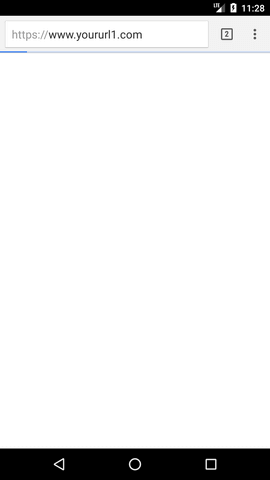Android Linkify 示例
Linkify 类用于从 TextView 或 Spannable 中创建链接。它根据文本值和正则表达式的匹配模式,将文本和正则表达式转换为可点击的链接。 Linkify 类通过使用模式来创建网页 URL、电子邮件地址、电话号码和地图地址的链接。
Android 可点击的链接可以通过两种不同的方式创建:
1. 使用布局 (.xml) 文件:使用指定类型的 autoLink 属性。
<TextView
android:id="@+id/url"
android:autoLink="web"/>
2. 使用Java类:它使用了指定类型的Linkify类的addlLinks()方法。
TextView webURL = new TextView(this);
webURL.setText("https://www.yoururl1.com/");
Linkify.addLinks(webURL , Linkify.WEB_URLS);
Android Linkify 示例
在该示例中,我们将为网页URL、电子邮件地址和电话号码创建链接。在布局目录中创建一个 activity_main.xml 文件,并添加以下代码。
activity_main.xml
<?xml version="1.0" encoding="utf-8"?>
<RelativeLayout xmlns:android="http://schemas.android.com/apk/res/android"
xmlns:app="http://schemas.android.com/apk/res-auto"
xmlns:tools="http://schemas.android.com/tools"
android:layout_width="match_parent"
android:layout_height="match_parent"
tools:context="example.javatpoint.com.androidlinkify.MainActivity">
<ListView
android:id="@+id/list"
android:layout_width="match_parent"
android:layout_height="wrap_content"
android:layout_marginBottom="50dp">
</ListView>
</RelativeLayout>
创建一个自定义布局 myList.xml 文件并添加以下代码。在此布局中,我们使用 autoLink 属性与 web、email 和 phone 属性。
myList.xml
<?xml version="1.0" encoding="utf-8"?>
<LinearLayout xmlns:android="http://schemas.android.com/apk/res/android"
android:layout_width="match_parent"
android:layout_height="match_parent"
android:orientation="horizontal" >
<ImageView
android:id="@+id/icon"
android:layout_width="60dp"
android:layout_height="60dp"
android:padding="5dp" />
<LinearLayout android:layout_width="wrap_content"
android:layout_height="wrap_content"
android:orientation="vertical">
<TextView
android:id="@+id/url"
android:layout_width="wrap_content"
android:layout_height="wrap_content"
android:text="Medium Text"
android:autoLink="web"
android:textStyle="bold"
android:textAppearance="?android:attr/textAppearanceMedium"
android:layout_marginLeft="10dp"
android:layout_marginTop="5dp"
android:padding="2dp"
android:textColor="#4d4d4d" />
<TextView
android:id="@+id/email"
android:layout_width="wrap_content"
android:layout_height="wrap_content"
android:text="TextView"
android:autoLink="email"
android:layout_marginLeft="10dp"/>
<TextView
android:id="@+id/phonenumber"
android:layout_width="wrap_content"
android:layout_height="wrap_content"
android:text="TextView"
android:autoLink="phone"
android:layout_marginLeft="10dp"/>
</LinearLayout>
</LinearLayout>
创建一个适配器类 MyListActivity.java 并使用以下代码扩展 ArrayAdapter<>。
MyListActivity.java
package example.javatpoint.com.androidlinkify;
import android.app.Activity;
import android.text.util.Linkify;
import android.view.LayoutInflater;
import android.view.View;
import android.view.ViewGroup;
import android.widget.ArrayAdapter;
import android.widget.ImageView;
import android.widget.TextView;
public class MyListAdapter extends ArrayAdapter<String> {
private final Activity context;
private final String[] url;
private final String[] email;
private final String[] phonenumber;
private final Integer[] imgid;
public MyListAdapter(Activity context, String[] url,String[] email,String[] phonenumber, Integer[] imgid) {
super(context, R.layout.mylist, url);
// TODO Auto-generated constructor stub
this.context=context;
this.url=url;
this.email=email;
this.phonenumber=phonenumber;
this.imgid=imgid;
}
public View getView(int position, View view, ViewGroup parent) {
LayoutInflater inflater=context.getLayoutInflater();
View rowView=inflater.inflate(R.layout.mylist, null,true);
TextView titleText = (TextView) rowView.findViewById(R.id.url);
TextView subtitleText = (TextView) rowView.findViewById(R.id.email);
TextView phonenumberText = (TextView) rowView.findViewById(R.id.phonenumber);
ImageView imageView = (ImageView) rowView.findViewById(R.id.icon);
imageView.setImageResource(imgid[position]);
titleText.setText(url[position]);
subtitleText.setText(email[position]);
phonenumberText.setText(phonenumber[position]);
Linkify.addLinks(phonenumberText,Linkify.PHONE_NUMBERS);
return rowView;
};
}
最后,在 MainActivity.java 类中,将适配器实例设置给ListView。
MianActivity.java
package example.javatpoint.com.androidlinkify;
import android.support.v7.app.AppCompatActivity;
import android.os.Bundle;
import android.widget.ListView;
public class MainActivity extends AppCompatActivity {
ListView list;
String[] urls ={
"https://www.yoururl1.com/","https://www.yoururl2.com/",
"https://www.yoururl3.com/","https://www.yoururl4.com/",
"https://www.yoururl5.com/","https://www.yoururl6.com/",
"https://www.yoururl7.com/","https://www.yoururl8.com/",
"https://www.yoururl9.com/","https://www.yoururl19.com/",
};
String[] emails ={
"email_1@mail.com","email_2@mail.com",
"email_3@mail.com","email_4@gmail.com",
"email_5@mail.com","email_6@mail.com",
"email_7@mail.com","email_8@mail.com",
"email_9@gmail.com","email_10@mail.com"
};
String[] phoneNumber ={
"+(1234)-567","+(1234)-567",
"7563654321","9475000000","8575000000",
"+1 (919) 555-1212","+91 (919) 555-1212",
"6463654321","5475000000","8575000000",
};
Integer[] imgid={
R.drawable.image_1,R.drawable.image_2,
R.drawable.image_3,R.drawable.image_4,
R.drawable.image_5, R.drawable.image_6,
R.drawable.image_7,R.drawable.image_8,
R.drawable.image_9,R.drawable.image_10,
};
@Override
protected void onCreate(Bundle savedInstanceState) {
super.onCreate(savedInstanceState);
setContentView(R.layout.activity_main);
MyListAdapter adapter=new MyListAdapter(this, urls, emails,phoneNumber,imgid);
list= findViewById(R.id.list);
list.setAdapter(adapter);
}
}
输出:

 极客笔记
极客笔记